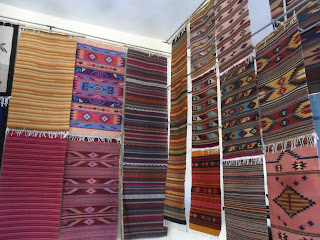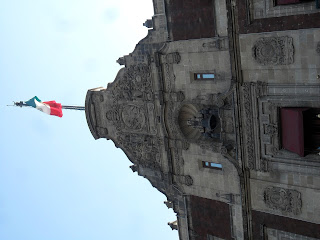hola! so right now I am sitting in cafe trying to work on my independent study project...which is totally not happening but I am enjoying the drone of chatter going on in the background and the mix of american and mexican music that is playing while I am sitting at a seat by the window. We just got back from a night in a village outside the city called Santa Ana de la Valle. (Santana have you?) It was a pretty cool stay. I felt pretty weird being there at first since we are a huge group and it seemed like a place that didn't get many tourists. But we ended up doing really interesting things that sort of made up for it. I really would like to improve my Spanish so I can have more in depth conversations with local people. I think I would feel less intrusive. We talked about it a bit in one of the debriefs that we've had on traveling in Mexico, that by talking with people directly you are in a way exchanging something. But showing your genuine interest and care in their story or opinions, you are offering them something. I thought that was a cool way to think about it. And of course I would be learning more..
Santa Ana has 2,700 people in the village and another 2,000 or so surrounding it. It is a Zapotec weaving community based in an area that once was Aztec. Both men and women weave these beautiful carpets, called "tapetes".
 |
| los tapetes! |
 |
| la iglesia de santa ana (church of santa anna) |
 |
poor sheep..the actual shearing was fine but hearing the noise of her skull banging against the cobblestones while she was trying to get away was a little disconcerting. the man spoke spanish but the women mostly only spoke Zapotec
 |
| washing the fleece |
|
 |
| fluffing and carding the fleece (here there was three natural colors; brown, grey, and white) |
 |
| spinning the wool...i was pretty impressed by this part, i dont really get how it works...it seems like the wool fibers wouldnt stay together as well as they do |
 |
| that red powder is ground of cochineal (a bug that lives among cactus), a red dye. historically its a pretty important export. the lemon juice sets the dye |
 |
| To dye the wool, they put the skeins in water boiling over a fire and let it sit for about an hour. here they are using natural dyes, this yellow color is from a type of moss. They can get up to 7 different shades based on how long they let the yarn soak up the color. They also showed us the cochineal, black walnut, and marigold dyes. |
 |
| a cool cactus. |
This morning we woke up early and met at 6:30am to climb a hill/mountain overlooking the valley. It was beautiful watching the sunrise as we hiked and seeing the surrounding area. The hike was pretty rocky..I wasn't expecting anything but at the top there were some Aztec ruins..there weren't really any structures, just retaining walls and the flattened tops of the peaks. A man and his son graciously took us up because people aren't allowed to go into the lands without someone from the community since it is community land. Everyone in the village had been really kind to us. They weren't getting any compensation for hosting us, I think UVM was just giving a general donation to the village.
After breakfast (fried egg and black bean enfrijoladas) we went to the town museum about its history. It was interesting to hear that they exchange weaving patterns with Navajo and Apache people. The man telling us everything had gone through all the cargos (which is an indication of social standing..the men complete these different tasks for the community to earn social rank). He told us he wanted to answer all of our questions from the bottom of his heart.
From there we went to a traditional healer who told us a little about how she practiced. She was self-taught and used herbs, foods, plants, and other methods to heal different fears, anger, illnesses, etc. She went around to all of us standing in a circle, blowing the smoke of what I think was burning myrrh and copal wood, as well as beating away bad energy with a bundle of plants. It was a really cool trip.
Nos vemos! (See yah)
(oh! and we tried cactus flower at the top of the hill that was oddly like kiwi. It was a bud filled with slimy black seeds that was slightly sweet. and the first night we found a scorpion in one of our bedrooms...they call them alacron here when they aren't poisonous..I still checked the walls before I went to sleep..)
























































